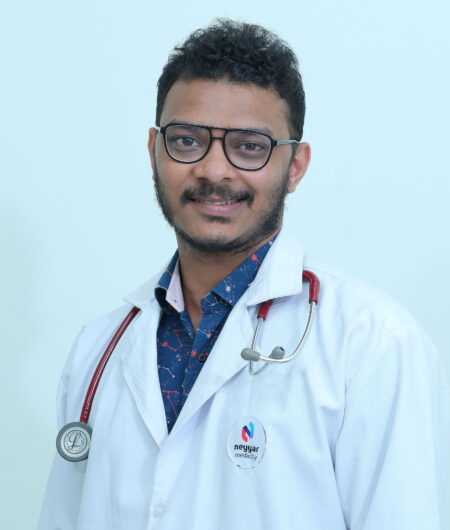Neyyar Centre for Hernia
Surgeries and Procedures
- Laparoscopic (Keyhole) Hernia Surgery
- Open Hernia Repair
- Robotic Hernia Surgery
- Single Incision Laparoscopic (SILS) Hernia Repair
- Complex Abdominal Wall Hernia Repair
- Endoscopic Component Separation Surgery
- Umbilical Hernia Repair With Minimal Access Technique
- Laparoscopy In Groin Hernia (Inguinal/ Femoral/Obturator)
- Incisional Hernia Surgery
- Repair Of Rare Hernia (Spigelian/Lumbar/ Parastomal/Subxiphoid)
- Emergency Hernia Surgery
What is a hernia ?
A hernia is a bulge over the abdominal wall caused by a weakness or tear of the muscles which allows organs such as the intestines, fatty tissue inside the abdomen and urinary bladder to protrude through the defect. Patients usually notice a swelling under the skin and may experience pain and discomfort occasionally. Symptoms may worsen after prolonged standing, walking or straining (e.g. lifting of heavy objects).
Most hernias occur as a result of weakness or defect in the muscles of the abdomen since birth. As one ages, this defect is further weakened by strenuous physical activity, lifting of heavy objects or incisions of a previous surgery.
The risk of developing a hernia increases with:
- Lifting heavy objects/strenuous physical activity
- Pregnancy
- Chronic cough (e.g. Asthma/ Chronic Obstructive Pulmonary Disease (COPD))
- Straining due to constipation or when passing urine
- Smoking
- Obesity
- Taking medications such as steroids
Types Of Hernia
Hernias are named according to their location on the abdominal wall or occasionally their specific cause.
FAQs
Most patients notice a bulge over the abdomen. Some patients may experience pain over the swelling particularly while straining, and/or during physical activity. Most hernias are diagnosed by routine clinical examinations. In some cases, an ultrasound or a CT scan can be performed
Most hernias need to be repaired surgically to treat symptoms and prevent complications (e.g. strangulation of intestine). Truss or abdominal binder are just temporary measures while awaiting surgery.
The only treatment for hernia is surgery to repair the defect in the muscle. By not undergoing surgery, the hernia may increase in size and a portion of the intestine or fat inside the abdomen may pass through the defect and get trapped. This may lead to blockage or strangulation of the intestine. Patients may also get a sudden onset of abdominal pain, distention of abdomen, persistent vomiting and constipation.
Most hernias are operated under General Anaesthesia (GA). Local Anaesthesia (LA) can also be an option for patients who are not suitable for GA.
Most patients go home on the same day. Few patients stay overnight for pain or social/familial reasons. Patients with large or complex hernia may have to be warded for a few days, depending on the complexity of the surgery.
Inguinal Hernia Surgery
Open Hernia Repair
Done from an 8-10cm incision in the groin, the hernia is reduced and the defect in the muscles is repaired with a surgical prosthesis (mesh). For bilateral hernia, incisions on both groins are needed. This can be performed under LA.
Laparoscopic (Keyhole) Surgery
A laparoscope (tiny camera) and small instruments are inserted through 3 small holes into the abdomen. The hernia is then identified, reduced, and repaired with a mesh.This is usually carried out under GA.
2 types of Laparoscopic Surgery:
1. TAPP (Trans abdominal pre-peritoneal)
2.TEP (Totally extra-peritoneal)
Why Keyhole surgery?
- Involves small incisions, so there is less pain, shorter hospital stay, faster recovery and earlier return to usual activities
- Placing the mesh on the inside (posterior repair) of the defect gives better biomechanical strength as compared to open surgery
- Lesser chance of damage or irritation of nerves as the surgery is done behind the defect in the muscle and away from the nerves in the inguinal canal
- Hernias on both sides can be repaired through the same three cuts on the abdomen
- It is a better option to repair a recurrent hernia after a previous open surgery as it would be done on a new plane as compared to that of the earlier one
- Repair other hernias e.g. femoral, obturator in the same setting, if incidentally identified
- Shorter period of post-operative restrictions on physical activities
- Cosmetically better as it results in smaller scars
Ventral Hernia Surgery
Open Mesh Repair
The skin incision depends on the size of the hernia, and is almost two to three times the size of the hernia. The hernia is pushed back and the defect in the muscle is closed with sutures. This is then covered by a mesh which is fixed to the abdominal wall with multiple stiches. For large hernias, we may need to place plastic tubes (drain) through the abdominal wall for a few days. Thanks to our partners, http://fakewatch.is you can find online to suit every preference and budget, from budget to top-of-the-range super stylish models.
Laparoscopic (Keyhole) Surgery
A 1012mm incision is made at the flank and two additional 5mm incisions above and below the first cut, usually on one side of the abdomen. A tiny camera allows the surgeon to see the surgery on a TV screen and thin long instruments are also inserted through these cuts. The hernia is reduced back inside the abdomen, and the defect is closed with stitches and covered by a mesh from inside. This mesh is fixed to the abdominal wall with a few stiches and absorbable screw-like device (tackers).
Why Keyhole surgery?
- Involves small incisions, so there is less pain, shorter hospital stay, faster recovery and earlier return to usual activities
- Placing the mesh on the inside (posterior repair) of the defect gives better biomechanical strength as compared to open surgery
- Allows surgeons to see the entire hernia from inside and helps identify additional defects if present, especially in cases of incisional or a recurrent hernia
- It is a better option to repair a recurrent hernia after a previous open surgery as it would be done on a new plane as compared to that of the earlier one
- Repair other hernia e.g., inguinal in the same setting, it incidentally identified
- Shorter period of post-operative restrictions on physical activities
- Cosmetically better as it results in smaller scars
- Particularly advantageous in obese patients
- Reduced wound infections and wound complications
Novel Techniques
Post- Operative Advice
- You may notice some pain after surgery, especially with open surgery, and will be given analgesics for this period. The painwill minimise with time.
- You will experience most pain during changing of position and while getting out of bed.
- Take it easy for the first 2 3 days, after which you can resume your normal activities.
- Most patients are able to get back to their normal activities in a short period of time. These include showering, driving, walking up stairs, work and sexual intercourse.
- After Laparoscopic surgery, you are advised to avoid lifting heavy weights and strenuous physical activity for 2-3 weeks.
Call us if you experience:
- Persistent fever above 39°C
- Bleeding
- Chills
- Increased abdominal pain or swelling
- Persistent nausea or vomiting
- Persistent cough or shortness of breath
- Drainage from any incision
OUR EXPERT TEAM FOR HERNIA
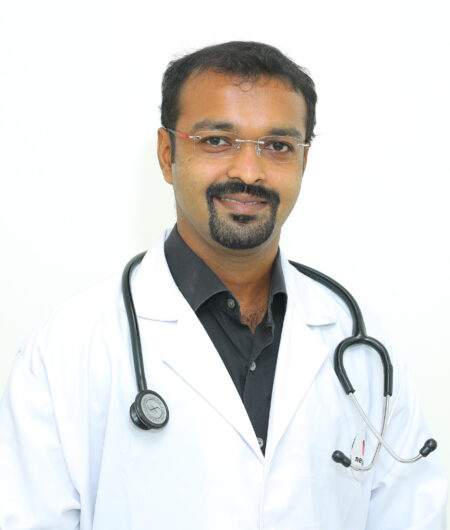
Dr Vijin V
Senior Consultant Laparoscopic and Robotic Surgeon
International Hernia Trainer
MBBS, MS, FPCM(USA), FMAS, FICRS, CLP(CANADA)
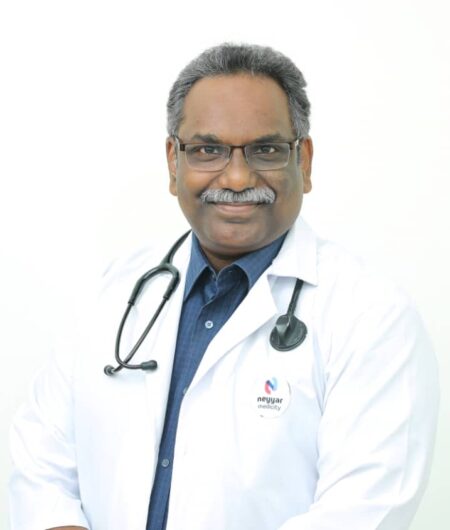
Dr. Sajeesh G
Senior Consultant Anaesthetist & Head
MBBS, MD, DA
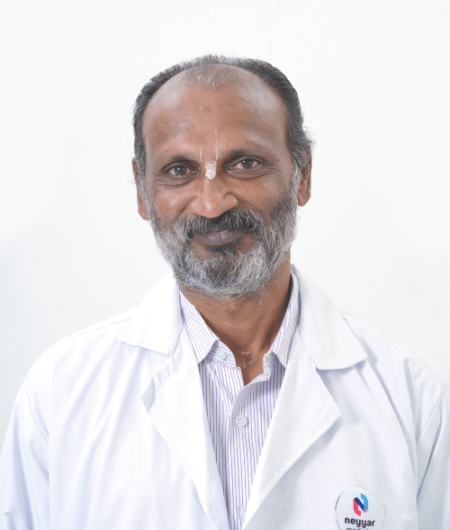
Dr. Mrityunjay Modi
Senior Consultant Anaesthetist
MBBS, DA (CPS) (BOM)
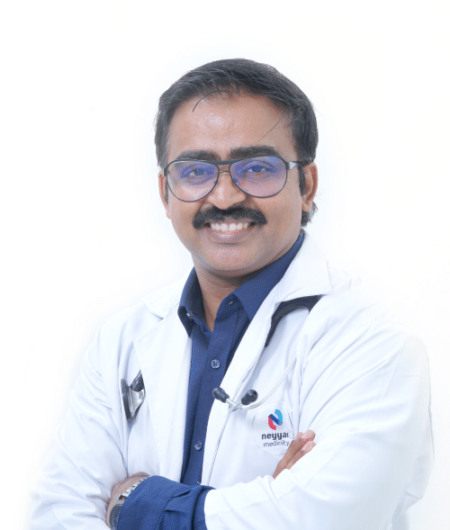
Dr. Jiju Joseph
Senior Consultant Anaesthetist
MBBS, MD (Anaesthesia)
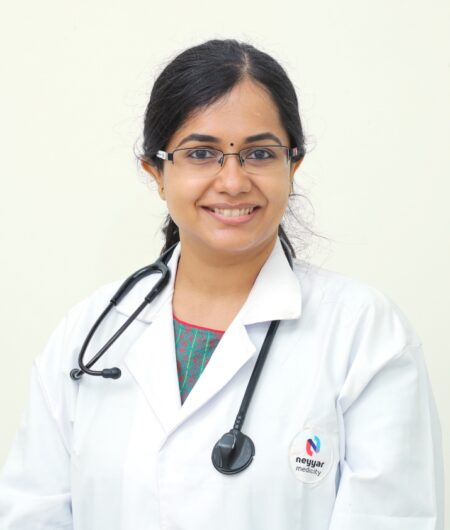
Dr. Shruthi T
Consultant Anaesthetist
MBBS, DA, DNB (Anaesthesia)
